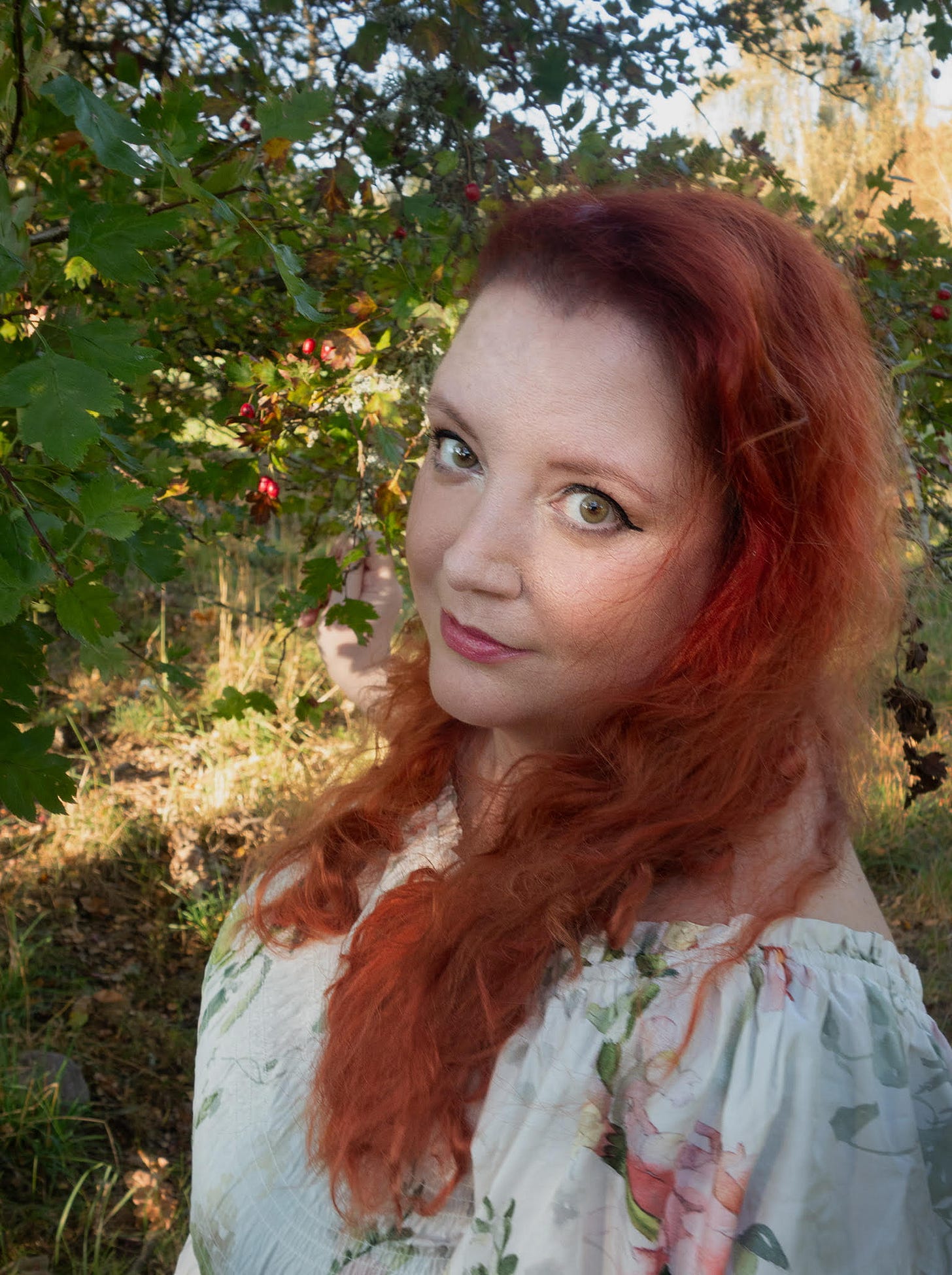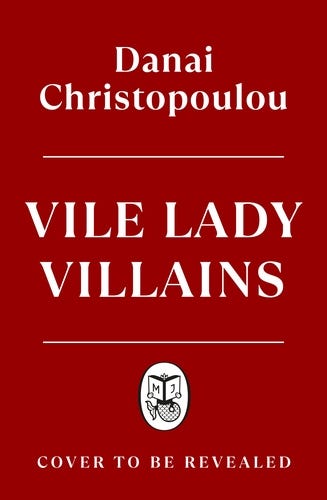I’m fascinated by strong female characters who are so often written as villains.
Danai Christopoulou's (neurodivergent) notes on writing
This week’s author interview has me nodding along vigorously throughout! Danai (being both a literary agent and an author) has an amazing insight into the writing world and talks so beautifully about the importance of writing and reclamation. They puts it so well and so succinctly: “To me, retelling is an act of rebellion.” I also couldn’t agree more with their point about the urgent need for better pay and working conditions in publishing.
Danai’s debut novel sounds so fantastic. Vile Lady Villains has such an imaginative premise, drawing on well-reviled fictional women and putting them together in a limbo realm. There’s honestly so many excellent neurodivergent debuts to support (some of whom have been interviewed on here like Callie Kazumi, Lucy Rose, Rachel Charlton-Dailey and Tom Newlands!). If you can afford to, pre-ordering our books helps massively and showcases to the industry just how important and valued our voices are.
Hey Danai! Tell us a bit about you and your work.
I grew up in Greece, on a diet of ancient myths and theatre plays. Both my parents were actors and huge mythology nerds, and this has been a continuous influence in my life. For instance, my debut horromantasy, Vile Lady Villains (coming out in March 2026 by Penguin Michael Joseph), is about Klytemnestra meeting Lady Macbeth in a limbo realm and having to work together to escape the confines of their story — with all the daggers to the throat that entails. And I absolutely blame my mother for making me memorize all their monologues at a tender age. She could have just bought me Barbies, you know? But in all seriousness, I’m grateful for it. I’m fascinated by strong female characters who are so often written as villains. It’s a recurring theme in my fiction: what happens when a character breaks free from their predestined narrative? What happens when we rewrite our stories? To me, retelling is an act of rebellion.
I have been writing all my life (my first article was published in Glamour Magazine when I was 19 years old, and I’ve been writing for magazines ever since) but I only dared to approach fiction in 2020, in a roundabout way: I started as a ghost writer, and quickly realized that if I can do this for other people, I should probably do this for myself.
Fiction is scary. It has unlocked and revealed so many things about me, things I got to discover along with my characters. But it can also be incredibly healing and life-saving, especially in these dark times we live in. Nowadays, I’m privileged to work with words in several different capacities: as an author, as an editor for Hugo-nominated khōréō magazine which publishes immigrant and diaspora authors, as an assistant literary agent at Tobias Literary Agency, and as a freelance editor and author coach.
Does being neurodivergent impact your creative process? And if so how?
It always did, even before I knew to call it “neurodivergence”. I was always either unable to motivate myself to do the things I had to do, or so hyper focused I would forget how to breathe, somehow managing to fit a week’s worth of work in the remaining 4 hours before a deadline. I call this method “Greek syrtaki” now, where I know I have to start slow and gradually accelerate until I reach a frantic pace just before the end, and I try to bake this into my estimated time for tasks. Having ADHD, and also living with Bipolar II disorder (and a few chronic health issues) means I’m painfully aware every day is not the same, in terms of creativity or productivity.
I have to meet myself where I am each day, with kindness. This is one of the main things I try to impart to my coaching clients as well, if they’re neurodivergent like me: most of the writing advice out there, things about consistency and writing every day, won’t work for us. We need to meet ourselves where we are each day, and work with the peaks and valleys we’re experiencing.
Is neurodiversity a theme in your work?
Not always intentionally, but it often sneaks up on me. In one of my as-of-yet-unpublished novels, the main character struggles with the feeling that her brain is “full of bees” because I was trying to articulate how it can feel for me when my ADHD takes over. In Vile Lady Villains, one of the two main characters evolved in a way that shares several ADHD and autistic traits I see in myself and my partner, who is autistic. I don’t think I intentionally set off to write neurodivergent characters — the same way I don’t intentionally set off to write queer characters, or genderqueer/non-binary characters. They just tend to come out like that, I wonder why!
What's one piece of advice would you give to aspiring neurodivergent writers out there?
You’re not failing. You’re not failing just because you can’t do things the way neurotypical authors can. You’re not failing because you can’t write as fast, or as often. There is no failure in creation. It’s a gift that’s always there for us, even if sometimes we’re not able to unwrap it.
Lean into your superpowers, and do this in your own time, in your own way.
Is there a book (or other kind of art) by a neurodivergent artist that you love and you'd like to draw our attention to?
I really love Don’t Let the Forest In by C. G. Drews, a fever dream of a book with glorious prose that often feels very familiar to how the inside of my brain sounds like. Although I’m not sure if that’s because of the author’s own neurodivergence, or because I happen to live in the middle of a forest and I’m fascinated by all the horrors it hides … or both.
What’s one thing the publishing industry could do to make things better and more accessible for neurodivergent writers?
Ouf, how much time do you have? So far I’ve been incredibly lucky with my own team, but that’s the thing: publishing is such a wonderfully bizarre beast, in the sense that there are no industry standards. Two debut authors, debuting with the same publisher, may have a wildly different experience based on the size of their advance, how invested their editor is, whether their book is planned as a lead title or not…
Even earlier, in the querying stage, query forms can look different from agency to agency, as can agent/client communication. That lack of defined expectations and clear industry standards can be hell for the neurodivergent brain, making you feel like you’re messing up all the time. And on the other side of this, you have people working in publishing who love books with a passion and try their absolute best to be good advocates and champions for their authors, but are very often too stretched thin, overworked and underpaid.
So … better salaries and working conditions for everyone, as a good starting point?
And lastly, how can readers of the newsletter support your work?
Please preorder Vile Lady Villains! I’m still amazed I get to tell this weird, queer, Greek myth meets Shakespeare story, and preorders help the publisher see that there’s an audience for my stabby sapphics. You can also add it on Goodreads and Storygraph. And please subscribe to my newsletter, Danai’s Dispatch, where I share first all Vile Lady Villains news, gush about books and short stories I loved, and share snapshots of my life in the frozen forest.
Finally, for as long as the assorted billionaires who own social media platforms allow it, you can find me in most places @danaiwrites.






Really loved this! Thanks for bringing a Greek writer's experience forward! Danai is a friend and they've edited a lot of my short stories--I'm so happy they will be debuting soon 🥰 can't wait to pick up their book.